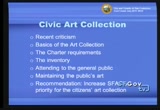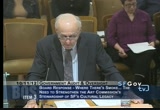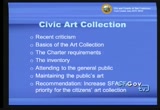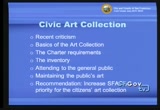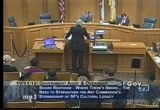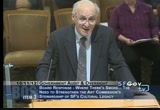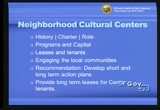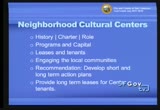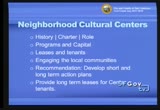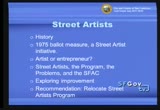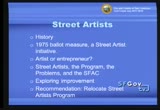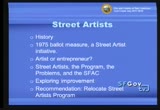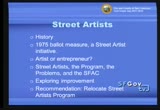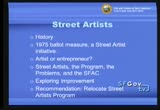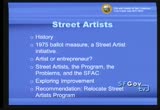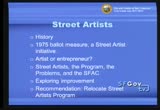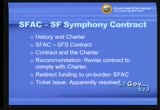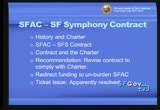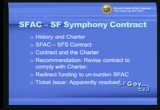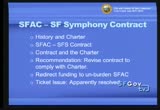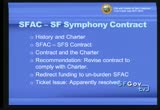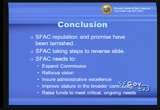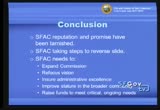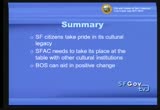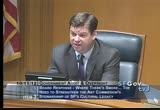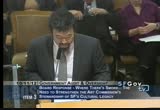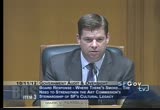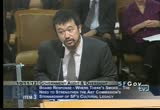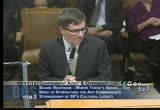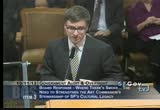tv [untitled] October 11, 2012 6:30pm-7:00pm PDT
6:30 pm
and i might add that there are other responses that have changed from the material that was presented us that we verified, but that's another matter. >> president farrell: can i ask you a quick question. obviously there have been lots of changes, personnel changes. have you had a chance to interact with the current staff? >> yes, we have. >> to your satisfaction in terms of time and so forth? because obviously if we have new staff they may have different ideas, hopefully stronger ideas, perhaps they're going to cure some of the past ills. i want to ask your opinion on that. >> we have done that. we do find a great deal of hope that the new staff will make great strides. and i think the morale that we have found as a result of that has improved.
6:31 pm
however, that's not enough to sort of stand on your laurels. the structure of the board is wrong. for the 2012 responsibilities of this commission. and we want to make that clear, that that's our position, based upon everything that we have learned in the past year of investigation. >> president farrell: thank you. >> the commission puts a higher priority on matters other than conserving the articles that are part of the collection, for maintaining the collection, for cataloging the collection, and for exhibiting the collection. the collection, which should be, is not a city attraction. i don't know if you knew about the collection before you walked into this room, or read our report. but it's a big deal. i mean it's $90 million, 4,000
6:32 pm
things. they do have mention of it on their website. they do have an iphone app but it's limited and incomplete and it really doesn't take advantage to show off the importance of what it is. and that's something that really should be done. and i think one can say that to some degree, even for me personally, before i joined the grand jury, the arts collection was a great city mystery. the budget for maintaining the art collection is unfortunately minimal. it's budgeted for 75,000 for maintenance of the art collection, and we learned that a good portion of that funding is used for graffiti abatement. which doesn't leave much money to sort of help to maintain the art that the city has. and that really needs to be addressed.
6:33 pm
most people in the art world have told us that we've asked, that 1% of the value of the collection is normally set aside for its maintenance. not an unreasonable number. that's $90,000. we recommend that the complete inventory of the collection be done quickly, and that the -- and that it continue in the future, that this not is a one-time shot. and as a result we have made a recommendation that funding for that purpose be made so that our art collection is maintained properly. >> president farrell: just to be clear, 90 million dollar collection? 1%, 900,000. >> 12 times -- >> yeah, i'm glad i have my
6:34 pm
colleagues in back of me on my back here so that we can make this -- >> president farrell: we all need help here. >> i do a lot. so, again, i think it's necessary to clarify the ambiguity caused by the charter and the -- i'm sorry. i misread. i think, again, just to sort of reiterate, the collection really needs to be addressed and attended to in a much greater way than it has been now. and i think, again, one of the other recommendations that we made has to do with the ambiguity that the -- that is caused by the charter and the administrative code, being at odds with the maintenance of
6:35 pm
the -- as to who maintains city art on park and rec -- rec and park grounds. the charter says it's the role of the arts commission. the administrative code disagrees somewhat and says it is the role of rec and park to do that. and it would be helpful to clarify that, and to make sure that the person -- the organization that is responsible has the wherewithal to pay for the maintenance of that art. briefly, i'd like to talk about the neighborhood cultural centers. they were born in 1967, as i mentioned before, the first in the nation for a city to develop such things. we have four physical buildings,
6:36 pm
as part of the cultural centers, one in the western addition, one in the bayview, one in mission, and one in south of market. and we have two virtual centers that are located in the south of market building. the charter says that the arts commission is to promote neighborhood arts programs, keep them open, make them continually accessible, and have ties with those programs, with the community. and annually the board of supervisors allocates funds to maintain, operate, and provide security for these cultural centers. and there is an obligation to repair and to maintain them. we were somewhat pleased that in recent days the capital planning committee have submitted a budget which deals with this in some way. and we just hope that those
6:37 pm
kinds of funds for capital improvements to buildings that are in great need to be rehabilitated will continue, as such as possible. we recommend that the arts commission find its way to engage local communities that are being served by these cultural centers to develop action plans for the funding of them, both long and short-term, for the operational stability of those organizations, so that they can actually function according to the demands of the charter and for the needs of the community, and to provide safety around those buildings so that there is a good feeling that people can come and participate. and i might just hypothetically state that there were two violent crimes committed in the bayview area.
6:38 pm
and when police chief found about that through our report he indicated that he would provide accommodations to increase the safety. and we really appreciate that response. it's important for the continued operation of the cultural centers that longer term or long-term leases be arranged for the tenants in those centers. right now, they are very short-term. they tend to be a year. and it's very difficult for the tenants, that receive grants, to operate for a year from the city, and from the arts commission, to go about developing adequate funding, because they are limited to a
6:39 pm
yearly contract. and if you are a funder, you would like a little bit more security, before you gave out a lot of money to an organization that has multi-year requirements. so we recommend, again, heartedly, that there be longer term leases. now, about our report concerning the street artists. interesting to know, proposition "l", 1975, as a result of a whole bunch of political action, from 1972 to that point, by the street artists who were -- who developed a rather substantial political organization to deal with it because they were being arrested for selling their art craft work on the streets,
6:40 pm
without proper authorization. if it wasn't -- if you think about this, for the street artists themselves to put this in a political vein, there wouldn't be a program that we're talking about today, they would still be individually running around the city, training to maintain and sell their stuff. so putting that in perspective, it's important to note that these are street artists when are making their living, selling work that they have done by themselves. and in that respect, these are more entrepreneurial folks who are -- some of them, it's their entire life support. they don't have any other jobs. it's important to note, though, that from the interviews and responses we have, there is very little interest, on the part of the commissioners themselves, of the arts commission, to serve on the street artists subcommittee.
6:41 pm
they find that violations and suspensions of the certificates that the street artists are required to have take up most of the time of those meetings, and there is no artistic interest that they find that is attractive to them. so as a result, the rookies of the board of the commission get assigned to that, not very happily either. but it's important because both prior past members of the commission and the commission members that we spoke to, and even some of the staff members, indicated that commissioners don't like -- they would rather serve on the art committees than deal with art in the community, and they don't find the arts -- street artist program to be that way.
6:42 pm
and so it becomes a problem, in terms of how this program is seen by the commission, managed by the commission, and how the street artists ultimately are treated as a result of that. the street artist program is independent of the remaining budget of the arts commission. they get all of their funding from the fees that the street artists put in, and they are managed in a way which suggests that they are independent organization. they don't have as much communication with the commission itself, as they had hoped to. there was a liaison committee that was established in 2010. it lasted a year, was disbanded. again, speaking to the issue.
6:43 pm
street artists tend to be, in our view, soul proprietorors, they're making a living at this. and the rules and management of it are around that issue. it talks to budgets, it talks to the space, and it talks to the fact that the artists themselves, the crafts people, have to prove that they are making the crafts that they sell. and that's all well and good, but as a program in the arts commission, it is just not given the same kind of attention that it deserves. to show how independent it is, even the legal expenses that were used to defend the street artists manager came from street artists fees. and it suggests that it puts a chilling effect on the voice of street artists who want to complain, who want to get their opinion made known to the
6:44 pm
commission. so it's an issue which certainly needs to be addressed and changed. the artists themselves, the street artists, are not a unified group. as anybody who has gone to meetings that street artists are present at, it's very political still. people have even told us that there's now a petition going around to try to have street artists indicate that they don't want to have the street artists program transferred out. i don't know if there's a petition. we just heard this. if you go to the street artists -- if you go to commission meetings, they're rowdy at times and there teems tseems to be no connection between the street artist programs and other san francisco programs. it is a convenient location for them but it is inappropriate to what that organization is trying
6:45 pm
to do. the grand jury went to a lot of effort to try to find the best option as to what should happen to the street artist program, in comparison to - to -- taking now appear £we discussed with several departments what possibilities exist. and after a lot of consideration, we agreed that the office of small business is the best fit. it tends to the needs of the sole proprietor interest of the street artist, and you can carry that forward from there. we think that the small business office will provide experienced business management, as part of its leadership, it will provide certainly needed program discipline, and it will certainly provide a better two-way communication system. so we would hope that you would
6:46 pm
agree with us that the small business administration is a much better fit to house the street artist program. and the fifth and final issue that we want to address is rather an odd issue. it's a contract that exists between the san francisco art commission and the san francisco symphony. and we find that to be a clear violation of the charter's intent. in 1935, during the ends of the depression or the continuation of the depression, the san francisco symphony was nearly bankrupt. the city of san francisco, the citizens of san francisco, as they have done in numerous occasions, voted in a tax, an
6:47 pm
adadd vel orm tax, a property tx for the purpose of maintaining a symphony orchestra. that tax now generates $2 million annually. we think that that's wise. look at what happened to the san francisco symphony. it's world-reimpound. renowned. it has done everything that it was intended to be. however we uncovered a contract between the san francisco arts commission and the san francisco symphony, which is a four year contract starting in 2010, running through 2014, in which the san francisco arts commission gives the san francisco symphony $2 million. the san francisco symphony, however, gives back to the arts commission, 40% of that, or
6:48 pm
$800,000. there are no restrictions on the use of that money, and there is no requirement or actual experience in the last number of years, for the san francisco arts commission to use that money to maintain a symphony orchestra. a clear violation of the intent of the charter. the $2 million tax and the giveback are in the same piece of paper. so one cannot say that they were not meant to be coupled. in addition -- and so we think -- we recommend that this situation be remedied, and that the contractor, should there be one, comply with the intent of the charter. we also believe that doing that would provide great hardship on the operating budget of the
6:49 pm
san francisco arts commission. and we have no interest to do that. but the charter rules in this case. and so we've recommended several ways in which that money can be made up. there are probably countless other ways, which i'm sure the crrl, the board of supervisors, and other departments, can sort through, so that the arts commission is not damaged irrep rehably by -- irrep rehabbably. we really are hopeful that that can happen. there was another issue that came up in that contract which has to do with tickets. but since the arts commission had made known to -- since the grand jury made known to the arts commission that there indeed was this problem with not reporting properly the
6:50 pm
disposition of these... the matter seems to be resolved, that we've been notified that the arts commission now properly records and notifies how it disposes -- sorry. so in essence, in closing, i'd just like to say that there is no doubt that the reputation and promise of the arts commission, in recent years, has been tarnished, that the arts commission has taken some steps to correct that, and they are to be commended for that.
6:51 pm
however, as i've been trying to relate, the arts commission needs to expand itself, in terms of its scope and number, it has to refocus its vision somewhat more on the community than just art organizations that provide programs, it has to ensure administrative excellence. now we do have a new leader in that regard. and from all intents and purposes, he's doing well. but so was the previous administrator, when he first started. and it's the responsibility of the arts commission to make sure, and professional artists are not the best people to look at budgets of administration, priorities of administration, to look at how administration is carrying out its assignment. and the arts commission needs to
6:52 pm
improve its stature to the community. we have quite a number of world renowned art and cultural organizations in this city. there is no reason why the arts commission should not be in that level. they certainly have the capacity -- they certainly have the responsibility to do that. and i think that speaks to the fact that they don't take care of their own needs well enough. so i think we have to find ways of raising sufficient funding so that the arts commission can take care of its ongoing needs. san francisco, over the years, has shown that it takes a great deal of pride in its cultural legacy. it has continually taxed itself,
6:53 pm
raised money for itself, put words in the charter which suggest that this is an important part of their life. the commission needs to understand that, and carry out its role in that realm. and we would hope that the board of supervisors can help it do that. i'm afraid that what the mayor is suggesting is that things are going along in a better way, that nothing else needs to be done. i think it's absolutely incumbent upon others to suggest that that is not sufficient, that the role of the san francisco arts commission is so significant to us that we really have to take bigger steps to make it a better and stronger and more grand organization. thank you very much. if there are any questions, i
6:54 pm
can call upon my come patriots to answer them if i'm not able. >> supervisor farrell: thank you for the time and for everyone's effort and your presentation. you did a remarkable job up there for so long. we're going to hear from the arts commission now and i know there are other departments here, but i think everyone on the board, and i think in the city would agree our arts are an important part of our legacy and also what keeps our neighborhoods vibrant and a great place to be. thank you for being the watchdog. appreciate it. at this time would the mayor office talk already but do we want to go to the arts commission unless i can give the arts commission another opportunity if they want to have -- if they have any follow follow-up comments. >> thank you again. leo chee, budget director with the mayor's office. i want to reiterate my thanks to
6:55 pm
the civil grand jury for your work and your interest in improving our city and the arts commission. i did want to just summarize some of the thoughts in the mayor's office about the report and the recommendations. i think we all agree that there has been challenges in the past and i think we're all in agreement that we're excited for the new director to continue to make changes. i think in the mayor's office, we are confident that there is progress being made and that it will continue to be made. i know some of the recommendations made involve changing the framework for how the commission should be structured. and i think that over all, the mayor's office would like to maintain the existing framework to the extent that we can, and to, you know, allow the changes that we see the staff and commission making with a new head of the commission, with a
6:56 pm
new head of the department, and a new deputy director. we think that we're seeing the changes that we want to see happen and we're going to continue to see them. so -- >> supervisor farrell: just a question on that. i mean the structure of the commission itself, 7 being -- i understand seven being current artist and four being independent is that correct? >> i believe it's 11 that are current office and then four that are at large with one ex-officio member. >> given what's going on historically, the fact there are new people in there, terrific, awesome, let's give them their chance to shine and have all faith that they will. but from a structural issue oily there have been legacy issues in the past. aside from the fact there's logistics from the charter amendment so forth, leaving that aside is there no desire to say we should potentially look to
6:57 pm
amend this? >> i think it was an interesting proposal that the civil grand jury put forward. i mean i do think that it's worth using the existing structure that we have now so that the commission can move forward. 15 is a relatively large number of people for a decision-making purposes and there is an executive committee that deals with governance. i think with the new head of the commission and certainly all of us in this room paying more attention to the work that the staff is doing and the commission's doing, i think we can using existing framework to make progress. so with that i just want to reaffirm the mayor's strong commitment to the importance of art, and this department, art is such a rich part of our city and, you know, we are -- it's hard to hear negative things about work that we're doing. but i do think that we are on the right track. so i'm happy to hand the mic over to tom delaney now from the arts commission.
6:58 pm
thank you. >> good afternoon, supervisors. thank you for your time. and thank you. i just want to start by thanking the civil grand jury. i started in my role as director of cultural affairs on january 9 of this year and one of the things that came first light to me was there his there was an investigation by the civil grand yir and that caused alarm on my behalf about what i was getting into. but i think it was important for me as to note that we live in a city where members of the civil grand jury care enough about a cultural legacy in san francisco, that they took the time and dedication to investigate, to meet with us in great detail, and at great length, to investigate what they felt were some concerns at the agency. i think as we've heard, the arts commission have been in a bit of a turn around agency stats. we've seen a great change in our leadership in a number of our
6:59 pm
policies and we're committed to following through with both the number of recommendations we see here today but just in general appear over all organizational improvement. i mean to say we're very lucky to live in a city where we are among the highest in art cap ta where cities are making tough budget decisions and cutting the arts and at the state level, california is at the bottom of the 50 states in terms of funding for the arts. so to be in a city where the arts are as important to be heard here at government audit and oversight committee is a testament to the fortune we have to the commitment of arts and culture as a core value and part of the core solution over all challenges we face of the city and the celebration of the city. i think to start there i think it's a great hono to serve in my role and work on some of these challenges ahead of us. >> presidentar
168 Views
IN COLLECTIONS
SFGTV: San Francisco Government Television Television Archive
Television Archive  Television Archive News Search Service
Television Archive News Search Service 
Uploaded by TV Archive on

 Live Music Archive
Live Music Archive Librivox Free Audio
Librivox Free Audio Metropolitan Museum
Metropolitan Museum Cleveland Museum of Art
Cleveland Museum of Art Internet Arcade
Internet Arcade Console Living Room
Console Living Room Books to Borrow
Books to Borrow Open Library
Open Library TV News
TV News Understanding 9/11
Understanding 9/11